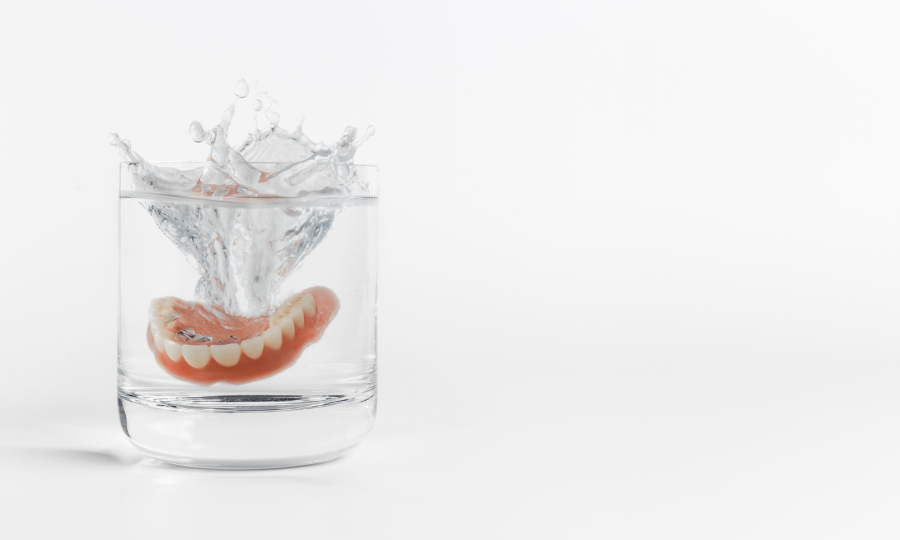How To Clean Dentures
Unfortunately, lost or damaged teeth are a common part of life.
Whether it’s due to aging, disease, injury, or accident, losing teeth can be a frustrating and saddening experience. Nobody wants to feel insecure about their smile.
Fortunately, many new developments in dental technology have allowed us to help more patients feel confident with their smiles. With different options for dentures, more patients are able to fall in love with their smiles again!
However, it’s critical to properly maintain and clean your dentures to maintain your incredible smile and protect your mouth from infection and disease. We’ll tell you everything you need to know about denture hygiene in this blog!
Daily Maintenance is Important
The most important thing to remember when cleaning your dentures is that you should clean them every day.
Daily cleaning helps keep your smile healthy and shiny. Over time, food particles can build up on your dentures. This layer of residue (almost like a thin film on your teeth and gums) can make your dentures appear discoloured.
Additionally, not cleaning your dentures daily can put you at risk for dental and oral problems, like periodontitis. Also known as gum disease, periodontitis is a dental condition that occurs when your teeth and gums aren’t properly cleaned, allowing plaque and tartar to build up.
If left untreated, periodontitis can lead to infection and bone loss. This can result in an implant failure, meaning you’ll need to visit your dentist to determine possible treatments to restore your smile.
Symptoms of Gum Disease
Healthy gums are pale pink, firm, and snug around your teeth. Signs and symptoms of gum disease can include:
- Bad breath
- Tenderness
- Bleeding easily
- Receding gums
- Hurts to chew/eat
- Swollen/puffy gums
- Pus between teeth/gums
- Loose teeth or loss of teeth
- New spaces between your teeth
- Bright red, dusky red, or purplish gums
- Spitting out blood when brushing/flossing
- Pink-tinged bristles after brushing your teeth
- A change in the way your teeth fit together when you bite
Removable vs. Implant-Supported Dentures
Dentures are artificial replacements for your natural teeth to maintain your mouth’s aesthetic look and feel, as well as functionality. There are 2 main types of dentures: removable dentures and implant-supported dentures.
Removable dentures are exactly what they sound like. These are a set of artificial teeth custom-fit to your mouth. You put your dentures in each morning and remove them each night.
Implant-supported dentures are also artificial teeth, but these dentures can be removable or non-removable depending on your preference and dental needs. With non-removable implants, the dentures are supported by several implants placed directly into the jaw bone.
After these implants have healed, your dentist can attach the dentures to the implants to complete your smile. These dentures are typically more stable than removable options.
 How To Clean Removable Dentures
How To Clean Removable Dentures
1) Remove & Rinse
First, remove and rinse your dentures (especially after eating). Run water over your dentures to thoroughly remove any food debris and loose particles.
Place a towel on the counter or in the sink to prevent your dentures from breaking if you drop them. Always handle your dentures with extra care.
2) Clean Your Mouth
Using a soft-bristled toothbrush, gently scrub your natural teeth, gums, tongue, cheeks, and palate (roof of your mouth).
Remove any remaining denture adhesive from your gums if necessary.
3) Soak & Brush
Place your dentures in a shallow bowl or cup filled with clean, warm water. Using a soft-bristled toothbrush and nonabrasive denture cleanser, gently scrub your dentures to remove food, plaque, and any particles.
Make sure to clean the grooves of your dentures where they attach to your gums. Never use a denture cleanser in or on your mouth.
4) Don’t Forget to Soak Overnight
At the end of your day, make sure your cleaned dentures are placed in a shallow bowl or cup filled with clean, warm water or with a mild denture-soaking solution overnight.
Most removable dentures need moisture to maintain their shape. You should confirm with your dentist about the proper storage of your dentures.
5) Rinse & Repeat
In the morning (or whenever your day starts), rinse your dentures thoroughly with warm water before inserting them back into your mouth. You want to make sure any denture-soaking solution has been removed from your dentures.
6) Schedule Regular Checkups
An important part of denture hygiene is to schedule and attend regular dental checkups. Your dentist can help you decide on a good schedule for appointments based on your needs and oral health. These checkups also ensure that your dentures are still working effectively and prevent any slippage, discomfort, or damage.
It’s also beneficial to have your dentures professionally cleaned. Your dentist can tell you what frequency you should follow for professional cleanings.
If you notice a change in how your dentures fit, feel, or look, visit your dentist as soon as possible. Ill-fitting dentures can cause irritation, oral sores, and even infection.
How To Clean Implant-Supported Dentures
1) Brush with Nonabrasive Products
Implant-supported dentures can be cleaned with a soft-bristled toothbrush and nonabrasive toothpaste. It’s important to brush your dentures as well as your gums, tongue, cheeks, and palate (roof of your mouth) to remove any plaque or food residue.
You should clean your dentures and mouth every morning and night.
2) Water Flossing
We recommend that you use a water flossing device to remove food and bacteria from your denture implants. These devices can cleanse hard-to-reach places, like the areas between your gums and dentures, to further prevent gum disease and denture damage.
Many water flossing devices have denture-specific attachments to help you brush and clean your implanted dentures.
3) Schedule Regular Checkups
To protect your implants and ensure your dentures are in the best possible condition, it’s important to schedule and attend regular dental appointments. Your dentist can professionally clean your dentures and make sure they’re functioning properly.
Regular checkups also help to detect and protect against infection and damage. If you notice a change in the fit, feel, or look for your implanted dentures, book an appointment with your dentist right away.
What To Avoid
When cleaning and caring for your dentures, there are some things to look for in order to protect your dentures and mouth. Generally, you should avoid:
- Abrasive cleaning materials (stiff-bristled brushes, strong cleansers, & harsh toothpaste)
- Whitening toothpaste (often have peroxide which doesn’t usually work for dentures)
- Bleach-containing products (ingredients can weaken your dentures)
- Hot or boiling water (high temperatures could warp your dentures)
Need Some Assistance?
If you have any questions or concerns regarding your dentures, please contact our office to book an appointment! We’re always here to help you look and feel your best.









